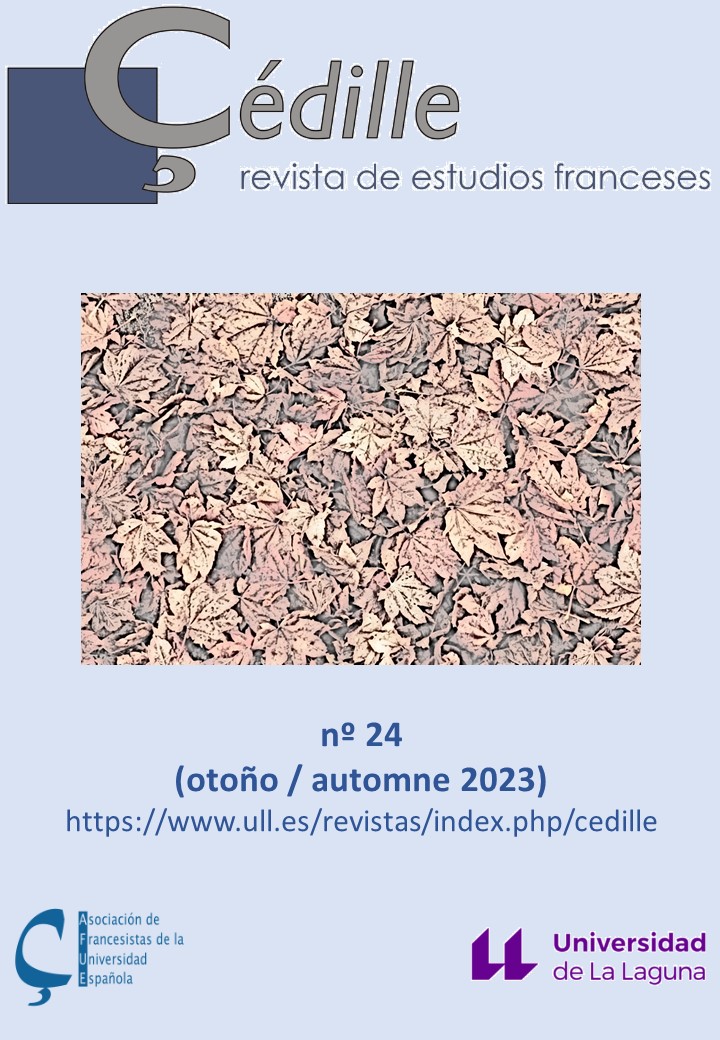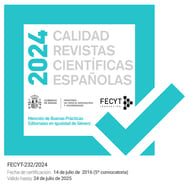La presencia de los géneros discursivos orales en el aula de francés como lengua adicional
Resumen
Este artículo se centra en las prácticas de enseñanza de la expresión oral de once profesores experimentados de francés de nivel intermedio (B1) en Escuelas Oficiales de Idiomas (EOI), con el objetivo de descubrir los enfoques lingüísticos y pedagógicos adoptados en clase. El análisis se centra en el papel y relevancia de la expresión e interacción orales, concretamente en el trabajo sobre los géneros discursivos orales. Los datos, obtenidos mediante entrevistas cualitativas, revelan que la expresión oral es una constante en el aula, pero que raramente se introduce a partir de un enfoque basado en los géneros, y que la mayoría de las actividades de expresión oral siguen partiendo de un enfoque basado en la forma.
Citas
ALAMRI, Wafaa Abdullah (2018): «Communicative Language Teaching: Possible Alterna-tive Approaches to CLT and Teaching Contexts». English Language Teaching, 11:10, 132-138. http://doi.org/10.5539/elt.v11n10p132
ALONSO ALONSO, Rosa (2014): Teaching Speaking: an Exploratory Study in Two Aca-demic Contexts. Porta Linguarum, 22, 145-160.
ALONSO ALONSO, Rosa [ed.] (2018): Speaking in a Second Language. Amsterdam, John Benjamins.
ALRABADI, Elie (2011): «Quelle méthodologie faut-il adopter pour l’enseignement/apprentissage de l’oral ?». Didáctica. Lengua y Literatura, 23, 15-34. https://doi.org/10.5209/¬rev_DIDA.2011 .v23.363 08
BATHIA, Vijay Kumar (2004): Worlds of written discourse: A genre-based view. Londres, Continuum.
BAJTTÍN, Mikhail Mikhaĭlovich (1986): Speech Genres and Other Late Essays [Traducción de V. W. McGee]. Austin, University of Texas Press.
BILGER, Mireille & Paul CAPPEAU (2004). «L’oral ou la multiplication des styles». Lan-gage e& société, 109: 3, 13-20. https://doi.org/10.3917/ls.109.0013
BRANCA-ROSOFF, Sonia (1999): «Types, modes et genres : entre langue et discours». Langage & Société, 87, 5-24.
BRINKMANN, Svend (2007): «Could Interviews Be Epistemic? An Alternative to Qualita-tive Opinion Polling». Qualitative Inquiry, 13: 8, 1116-1138. https://doi.org/10.1177/¬1077800407308222
BURNS, Ann (2006): «Teaching Speaking: A Text-Based Syllabus Approach», in Esther Usó-Juan & Alicia Martínez-Flor (eds.), Current Trends in the Development and Teaching of the Four Language Skills. Berlín / Nueva York, de Gruyter, 235-258. https://doi.org¬/10.1515/ 9783110197778
BURNS, Ann (2012): «A Holistic Approach to Teaching Speaking in the Language Class-room», in Mikael Olofsson (ed.), Symposium 2012 - Lärarrollen i svenska som an-draspråk. Estocolmo, Stockholms Universitet, 165-178.
BURNS, Ann (2017): «Research and the Teaching of Speaking in Second Language Class-room», in Eli Hinkel (ed.), Handbook of Research in Second Language Teaching and Learning. Vol. 3. Nueva York, Routledge, 242-256.
CAÑADA PUJOLS, Maria Dolors (2019): «Evalúo, luego… ¿aprendo? La evaluación entre iguales como instrumento para mejorar la competencia oral en FLE». Çédille, re-vista de estudios franceses, 15, 109-137. https://www.ull.es/revistas/index.php/cedille/article/view/1640
CAÑADA PUJOLS, Maria Dolors & Alba MILÀ-GARCIA (2023): «Washback on speaking and spoken interaction: teachers’ perceptions in the French as an Additional Language classroom». Porta Linguarum. Revista interuniversitaria de Didáctica de las Lenguas Extranjeras, 40, 25-39. https://doi.org/10.30827/portalin.vi40.21814
CHARTRAND, Suzanne-Geneviève (2016): «Les genres du discours : point nodal de la discipline français», in Glais Sales Cordeiro & David Vrydaghs (eds.), Statuts des genres en didactique du français. Namur, Presses universitaires de Namur, 53-81. https://¬books.openedition.org/pun/6157
CLAUDEL, Chantal & Véronique LAURENS (2016): «Le genre discursif comme objet d’enseignement en didactique du français». SHS Web of Conferences, 27, Article 07005. https://doi.org/10.1051/shscon f/20162707005
CORTÉS RODRÍGUEZ, Luis (2009): Comentario pragmático de comunicación oral II. Entre-vistas informativas. Madrid, Arco Libros.
DOLLEZ, Catherine & Sylvie PONS (2013): Alter ego B1. Montpellier, Hachette Langue Étrangère.
DOLZ, Joaquim & Bernard SCHNEUWLY (2002): Pour un enseignement de l’oral. Montrouge, ESF.
FLOWERDEW, John (2004): «The discursive construction of a world-class city». Discourse and Society, 15: 5, 579-605. https://doi.org/10.1177/0957926504045033
GARCÍA-BALSAS, Marta & Carmen LÓPEZ-FERRERO (2023): «Debates en el aula de es-pañol como lengua adicional: criterios para evaluar la producción oral». Porta Linguarum. Revista interuniversitaria de Didáctica de las Lenguas Extranjeras, 39, 147–164. https://doi.org/10.30827/portalin.vi39.23533
GENERALITAT DE CATALUNYA (2021): Ensenyament d’idiomes. URL: http://www.-gencat.cat/¬ensenyament/eac/pdf/IDI_CA.pdf.
GOH, Christine Chuen Meng & Ann BURNS (2012): Teaching Speaking: A Holistic Ap-proach. Cambridge, Cambridge University Press.
GUIMARÃES-SANTOS, Luiza (2012) : «Perspective actionnelle et genres textuels : le mo-dèle didactique dans l’enseignement du français langue étrangère». Synergies Can-ada, 5. https://doi.org/10.2108 3/synergies.v0i5.1686
HALL, Joan Kelly (1993): «The role of oral practices in the accomplishment of our every-day lives: The sociocultural dimension of interaction with implications for the learning of another language». Applied Linguistics, 14: 2, 145-167. https://doi.org/10.1093/applin/14.2.145
HALL, Joan Kelly; John HELLERMANN & Simona PEKARAK DOEHLER [eds.] (2011): L2 interactional competence and development. Clevedon, Multilingual Matters.
HOLTER, Marianne TS.; Ayna B JOHANSEN; Ottar NESS; Svend BRINKMANN; Mette T. HØYBYE & Håvar BRENDRYEN (2019): «Qualitative interview studies of working mechanisms in electronic health: Tools to enhance study quality». Journal of Me-dical Internet Research, 21: 5, e10354. https://doi.org/10.2196/10354
JACQUIN, Marianne (2016): «Enseigner l’exposé oral dans une perspective inter-linguistique : des prescriptions officielles à la planification et réalisation en classe», in Glais Sales Cordeiro & David Vrydaghs (eds.), Statuts des genres en di-dactique du français. Namur, Presses universitaires de Namur, 237-260. https://books.openedition.org/pun/6222
KERBRAT-ORECCHIONI, Catherine (1997): «A Multilevel Approach in the Study of Talk-In-Interaction». Pragmatics, 7: 1, 1-20. https://doi.org/10.1075/prag.7.1.01ker
KERBRAT-ORECCHIONI, Catherine & Véronique TRAVERSO (2004): «Types d’interactions et genres de l’oral». Langages, 153: 1, 41-51. https://doi.org/10.3917/lang.153.0041
KRIPPENDORFF, Klaus (2004): Content Analysis. An Introduction to its Methodology. Thou-sand Oaks, Sage. 2.ª ed.
KUCHARZYK, Radoslaw (2012): «Construire un discours oral, oui… mais comment ? L’impact de la pragmatique de l’oral sur la didactique des langues étrangères». Synergies Canada, 5. https://doi.org/10.21083/synergies.v0i5.1455
MALRIEU, Denise & François RASTIER (2001): «Genres et variations morphosyn-taxiques». Traitement Automatique des Langues, 42: 2, 547-577. http://doi.org/10.3917/¬rfla.052.0101
MARTÍN-PERIS, Ernesto ; Carmen LÓPEZ FERRERO & Carme BACH (2021): «Plurilin-gual discourse competence: Assessing genres at the Threshold Level». Journal of Applied Linguistics and Professional Practice, 15: 3, 265-287. https://doi.org/10.1558/¬jalpp.21052
[MCER 2001] Consejo de Europa (2001): Marco común europeo de referencia para las lenguas: aprendizaje, enseñanza, evaluación. Madrid, Ministerio de Educación, Cultura y Deporte.
[MCER 2021] Consejo de Europa (2020): Marco común europeo de referencia para las lenguas: aprendizaje, enseñanza, evaluación. Volumen complementario. Estrasburgo, Servicio de publicaciones del Consejo de Europa. https://www.coe.int/lang-cefr
MERCER, Neil; Paul WARWICK & Ayesha AHMED (2017): «An Oracy Assessment Toolkit: Linking Research and Development in the Assessment of Students’ Spo-ken Language Skills at Age 11-12». Learning and Instruction, 48, 51-60. https://doi.org/10.1016/¬j.learninstruc.2016.10.005
MOIRAND, Sophie (2003): «Quelles catégories descriptives pour la mise au jour des genres du discours ?» [Texto editado en línea en univ-lyon2.fr: icar.univ-lyon 2.fr S. Moirand - Study day entitled “les genres de l’oral”). URL: https://hal-univ-paris3.archives-ouvertes.fr /hal-01507281/document
PALTRIDGE, Brian (2001): Genre and the language learning classroom. Michigan, Universi-ty of Michigan Press.
PRIOR, Matthew T. (2018): «Accomplishing “rapport” in qualitative research interviews: Empathic moments in interaction». Applied Linguistics Review, 9: 4, 487-511. https://doi.org/10.1515/applirev-2017-0029
SALES CORDEIRO, Glais, & David VRYDAGHS [eds.] (2016): Statuts des genres en didac-tique du français. Namur, Presses universitaires de Namur. URL: https://books.openedition.org/pun/6082
SAVIGNON, Sandra Joy (2017): «Communicative Competence», in John I. Liontas & Margo DelliCarpini (eds.), The TESOL Encyclopedia of English Language Teach-ing. Hoboken, Wiley-Blackwell, 1-7. https://doi.org/10.1002/9781118784235.eelt0047
SWALES, John Malcom (1990): Genre Analysis: English in Academic and Research Settings. Cambridge, Cambridge University Press.
TAJEDDIN, Zia & Minoo ALEMI (2018): «Genres of Spoken Interaction», in John I. Liontas & Margo DelliCarpini (eds.), The TESOL Encyclopedia of English Lan-guage Teaching. Hoboken, Wiley-Blackwell. https://doi.org/10.1002/9781118784235.eelt0709
TAYLOR, Steven. J. & Robert Bogdan (1987): Introducción a los métodos cualitativos de investigación. Barcelona, Paidós, vol. 1.
VAN COMPERNOLLE, Rémi & Nuria BALLESTEROS SORIA (2020): «Developing interacti-onal repertoires in the classroom through dynamic strategic interaction scena-rios». Vigo International Journal of Applied Linguistics, 17, 141-169. https://doi.org/10.35869/¬vial.v0i17.1468
VION, Robert (1993): La communication verbale. París, Hachette.
WARING, Hansun Zhang (2018). «Teaching L2 interactional competence: Problems and possibilities». Classroom Discourse, 9, 57-67. https://doi.org/10.1080/19463014.2018.¬1434082
WOOLARD, Kathryn A. (2008): «Why dat now?: Linguistic-anthropological Contribu-tions to the Explanation of Sociolinguistic Icons and Change». Journal of Sociolin-guistics, 12: 4, 432-452. https://doi.org/10.1111/j.1467-9841.2008.003 75.x
ZHAO, Jing (2018): «Lesson Planning for Teaching Speaking», in John I. Liontas & Margo DelliCarpini (eds.), The TESOL Encyclopedia of English Language Teach-ing. Hoboken, Wiley-Blackwell. https://doi.org/10.1002/9781118784235.eelt0249
Derechos de autor 2023 Çédille, revista de estudios franceses

Esta obra está bajo licencia internacional Creative Commons Reconocimiento 4.0.






